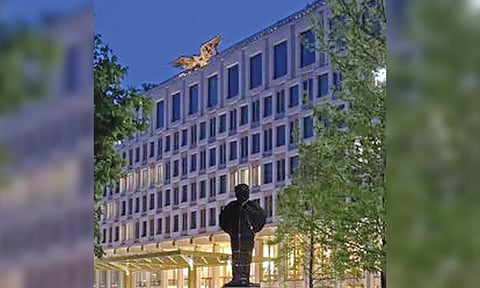

• From the Eagle Bar on the top floor of the new Chancery Rosewood Hotel in Mayfair, the views across London are unobstructed, save for a gilded aluminium eagle, its wings spread wide, which crowns the midcentury modern building that once housed the US Embassy to the United Kingdom.
The Americans pulled up stakes in 2018, relocating the embassy to a giant fortified cube on the south bank of the Thames. They left behind the eagle, along with a collection of monuments and memorials in the adjoining Grosvenor Square — relics of what was once an American citadel in its ancestral land.
John Adams lived on the square. Gen. Dwight Eisenhower had his wartime office there. A statue of Franklin Roosevelt gazes across the patchy lawn. Diplomats threw star-spangled election night parties, while hopeful travelers lined up outside for visas. During the Vietnam War, protesters clashed with police under the trees.
Now, Grosvenor Square is being recast for a post-American age. The Chancery plans to open to guests in early September, its Persian Gulf owners having converted the Brutalist landmark, designed by Eero Saarinen, into a Rosewood luxury hotel, with junior suites starting at 1,400 pounds (nearly $1,900) a night.
The square is closing this week for a 13-month refurbishment. The project will add lush plantings that celebrate biodiversity and link the 6-acre expanse, which has fallen into a state of neglect, more closely to its 18th-century Georgian roots. The owner, Grosvenor Property, insists it is preserving the legacy of a place once known as “Little America.”
But Grosvenor Square attests to how much the world has changed, not least since President Donald Trump returned to the White House. Start with the fact that the embassy was bought by investors from Qatar, whose government recently gave the Trump administration a Boeing 747 as a replacement for Air Force One.
Ties between Britain and the US ebb and flow, Chatham House’s director of the US and Americas programme noted, in a “special relationship” that is neither as serene nor as harried as often portrayed. A new global crisis could swiftly bring these old allies back together. But Trump’s acrimonious dealings with Europe have indisputably changed the mood.
Trump, who has a soft spot for the royal family and other totems of imperial Britain, complained bitterly about the sale of the embassy. He blamed it, wrongly, on his predecessor President Barack Obama. (The decision was made during the George W. Bush administration because of security concerns.)
“We had the best site in all of London,” Trump said in 2018. The new location, in a redeveloped industrial section of London known as Nine Elms, was “lousy,” he said, spurning an invitation to a ribbon cutting.
Converting a diplomatic fortress into a sleek, five-star hotel was a design and engineering test for Qatari Diar, a real estate company backed by Qatar’s sovereign wealth fund.
James Raynor, the newly named CEO of Grosvenor, acknowledged the complicated political backdrop to the project. But he said, “I don’t think we should be altering it for the long term on the basis of short-term noise.”
@ The New York Times